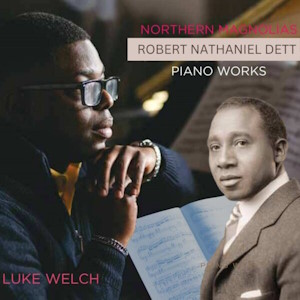
Robert Nathaniel Dett (1882-1943)
Northern Magnolias
Magnolia Suite (1912)
Nepenthe and the Muse (1922)
Cave of the Winds (1902)
In the Bottoms (1913)
After the Cakewalk (1900)
Inspiration Waltzes (1903)
Luke Welch (piano)
rec. 2024, Jane Mallett Theatre, Toronto
Private release [52]
R. Nathaniel Dett was a pioneering Canadian-born Black classical pianist. He studied in New York and later at Oberlin Conservatory in Ohio, graduating in 1908, taught for nearly two decades at the Hampton Institute of Music in Virginia, and is notable for having made a small series of piano rolls soon after graduating, in piano and composition, in 1912. Then in 1919 he made what I believe is his only disc recording for the obscure Broome label. Strangely, he didn’t record his most famous piece, the Juba Dance from his In the Bottoms suite, composed just six years before – Percy Grainger did though, the following year in 1920 – but coupled the Barcarolle from the same suite with Mammy from the Magnolia Suite. This Broome disc has been reissued in recent years by Parnassus PACD96067 (a semitone below correct pitch) and by Marston 52076-2, correctly pitched.
Now here’s a 52-minute disc from Luke Welch, born in Toronto, that includes both suites and adds some descriptive and characterful pieces to round out a disc portrait of Dett that’s sure to please those who are attracted to the genre. Welch’s performance of the In the Bottoms suite is right to trace Black experience in the South, though one that’s refined through romance and reverie. He reprints Dett’s own composer’s note to the suite which gives a perceptive take on the five individual movements. ‘His Song’ is yearning and rich in sentiment, whilst ‘Honey’ is scherzo-like and sprightly. The fourth number is the Barcarolle that Dett recoded in 1919 though with some textual deviations from his own score. Welch is faithful to its rhythms, though it can’t help sounding rather repetitious and dull, whilst the carefree composer puts it over with cavalier zest. In the Juba dance Welch enjoys its sheer vitality and brio.
If Dett left behind composer’s notes for the Magnolia suite, they’re not reprinted here. Dett’s performance of Mammy is characteristically quite capricious and free, departing from his own music at a number of points. Welch is metrically more regular, textually accurate and slightly slower too. ‘The Deserted Cabin’ is stalking, halting and descriptively romantic, ‘My Lady Love’ daintiness itself and the finale full of bonhomie.
There are four other brief pieces in Welch’s recital. The first is the insinuating and evocatively titled Nepenthe and the Muse and Cave of the Winds, which relates to an attraction then – and still now – near Niagara Falls, which teems with the sounds of the Big Top, carousel and good times. After the Cakewalk is another compact character study that mines Ragtime, complete with an ingenious second strain. The final piece is Inspiration Waltzes, a sequence of three waltzes, charmingly etched, vital and charismatic and put across with real appreciation of their vitality and warmth.
There are several discs of Dett’s piano music available. I have to be honest, I’ve not heard those of Clipper Erickson on Navona – who also includes the suites Enchantment, Cinnamon Grove, Tropic Winter and the Bible Vignettes – or Denver Oldham on New World, who also includes the Bible Vignettes but not the four small pieces Welch plays, to take two examples, but I enjoyed Welch’s well prepared and generous-minded performances which have been well recorded in the Jane Mallett Theatre, Toronto.
Jonathan Woolf
Availability: Artist’s website


















